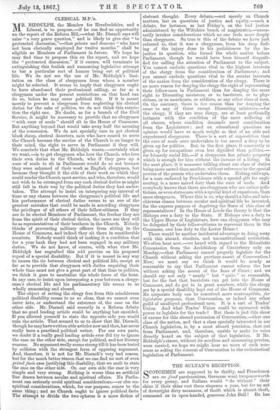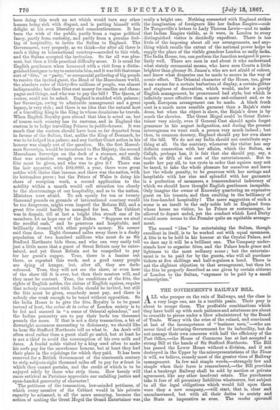THE SULTAN'S RECEPTION.
COTCHMEN are supposed to be thrifty, and Frenchmen S are au fond parsimonious, Germans want twopenceworth for every penny, and Italians would "do without " their skins if their skins cost them sixpence a year, but for an act of downright dirty meanness, of thrift which is almost theft, commend us to open-handed, generous John Bull He has been doing this week an act which would turn any other human being sick with disgust, and is patting himself with delight at his own liberality and conscientiousness. It has been the wish of the public, partly from a vague political fancy, partly from curiosity, and partly from a genuine feel- ing of hospitality, to invite the Sultan to England. The Government, very properly, as we think—for after all there is such a thing as international courtesy—acceded to this wish, and the Sultan accepted the invitation. So far all was plea- sant, but then a little practical difficulty arose. It is usual for English gentlemen when honoured with a visit from a distin- guished foreigner to tryto entertain him, and it was felt that some sort of "fête," or "party," or ceremonial gathering of big people to receive the invited guest, the Head of the Mussulman world, the absolute ruler of thirty-five millions of people, was almost indispensable; but then fetes cost money for candles and cham- pagne and things, and who was to pay the bill ? The Queen, of course, could not be asked. England is studded with palaces ; her Sovereign, owing to admirable management and a great legacy, is very rich ; and there is an idea that the natural host of a travelling King is the King in whose dominions he travels. When English Royalty goes abroad that idea is acted on, but of bourse each country has its customs, and in England the custom is to lodge travelling Princes in public-houses. It was much that the custom should have been so far departed from in favour of the Sultan, that, unlike the King of Denmark, he was to be lodged in a palace; and any further Court action in his honour was simply out of the question. He, the first Mussul- man Sovereign, would be introduced to Her Majesty, the second Mussulman Sovereign on the deck of a steamer, and surely that was attention enough even for a Caliph. Still, the fete must be given, and who was to give it There was the heir apparent, with 100,000/. a year, there were great nobles with thrice that income, and there was the nation, with its bottomless purse ; but the Prince of Wales is doing his share of reception work, a second application to the nobility within a month would call attention too closely to the shortcomings of our hospitality, and as to the nation, Ministers were afraid. To ask openly for ten or twenty thousand pounds on grounds of international courtesy would be too dangerous, might even imperil the Reform Bill, and a great fête could hardly be managed for less. The Cabinet was in despair, till at last a bright idea struck one of its members, let us hope one of the Dukes. " Suppose we steal the needful cash," and be generous and hospitable, and brilliantly dressed with other people's money. No sooner said than done. Eight thousand miles away there is a dusky population of two hundred millions who must do as Sir Stafford Northcote bids them, and who can very easily toil just a little more that a guest of Great Britain may be enter- tained, and yet Great Britain not be compelled to pay for her guest's supper. True, there is a famine out there, as reported this week, and a good many people are dying of hunger, but, after all, they are dark- coloured. True, they will not see the show, or even hear of the show till it is over, but then their masters will, and they must be content. True, the conditions of the fête, the rights of English nobles, the claims of English squires, require that nobody connected with India should be invited, but still the fête must be given, somebody must pay, and there is nobody else weak enough to be taxed without opposition. So the India House is to give the fête, Royalty is to be guest instead of host, the crime de la creme of London society is to be fed and amused in "a scene of Oriental splendour," and the Indian peasantry are to pay their lords ten thousand pounds the more. If that is not a dirty transaction, a bit of downright meanness amounting to dishonesty, we should like to hear Sir Stafford Northcote tell us what is. An Arab will often steal rather than a guest shall go unfed, but at least he is not a thief to avoid the consumption of his own milk and dates. A feudal noble visited by a king used often to make his serfs pay for the unwelcome honour, but at least they had their place in the rejoicings for which they paid. It has been reserved for a British Government of the nineteenth century to strip subjects eight thousand miles off to pay for a-feast in which they cannot partake, and the credit of which is to be enjoyed solely by those who strip them. How keenly will races satirical as Parisians appreciate our unfailing justice and open-handed generosity of character 1 The pettiness of the transaction, low-minded pettiness, of which every member of the Cabinet would in his private capacity be ashamed, is all the more annoying, because the notion of making the Great Mogul the Grand Entertainer was really a bright one. Nothing connected with England strikes the imagination of foreigners like her Indian Empire—vide De Tocqueville's letters to Lady Theresa Lewis—and to make that Indian Empire visible, as it were, in London to every distinguished visitor is decidedly expedient. There is too little of the imposing about all our arrangements, and any- thing which recalls the extent of the national power helps to- supply the place of the visible grandeur London so sadly lacks. The India House, too, can perform the function assigned it pecu- liarly well. There are men in and about it who understand what stately ceremonial means, who have seen Courts a little brighter than gloomy St. James's, who are not afraid of colour, and know what draperies can be made to secure in the way of scenic effect. The Oriental character of the House, too, gives it an excuse for a certain barbarism of display, a certain glitter- and staginess of decoration, which would, under a purely English management, be pronounced bad style, but which is- infinitely more effective than a more sad-coloured and, so to speak, European arrangement can be made. A black frock coat is a much more sensible garment than a Rajah's state dress, but when the object is show, the Rajah's dress is by much the showier. The Great Mogul could be Great Enter- tainer very nicely, even if General Oust should again forget grammar in his august indignation, and during the present interregnum we want such a person very much indeed ; but then, in common decency, England should pay her own share- of the bill. We do not say India should not contribute any- thing at all. On the contrary, whenever the visitor has any definite connection with her affairs, which the Sultan, as Caliph, perhaps has, it is fair that she should pay, say, a fourth or fifth of the cost of the entertainment. But to• make her pay all, to tax ryots in order that squires may not be taxed, to take the whole pleasure for ourselves and leave her- the whole penalty, to be generous with her savings and hospitable with her rice and splendid with her garments is a perfection of meanness, a transcendental indecency of which we should have thought English gentlemen incapable. Only imagine the owner of Knowsley quartering an expensive guest on his tenants, and then exulting in the brilliancy of his free-handed hospitality! The mere suggestion of such a scene is an insult to the only noble left in England from whose house no visitor, be he Prince or costermonger, is allowed to depart unfed, yet the conduct which Lord Derby- would scorn seems to the Premier quite an equitable arrange- ment.
The second " idea" for entertaining the Sultan, though- excellent in itself, is to be worked out with equal meanness. A fête is to be held in his honour at the Crystal Palace, and we dare say it will be a brilliant one. The Company under- stands how to organize fetes, and the Palace lends grace and lightness to the most ordinary scene ; but the entertain- ment is to be paid for by the guests, who will all purchase tickets at five shillings and half-a-guinea a head. There is not the slightest objection to that arrangement, but then let the fête be properly described as one given by certain citizens: of London to the Sultan, "expenses to be paid by a small subscription."































 Previous page
Previous page